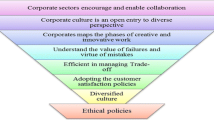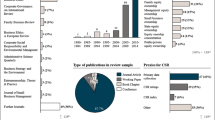Abstract
This paper examines the effect of ethical performance on the value of a company and the attractiveness of its stocks for major owners; institutional investors and insiders. Using the Ethisphere® Institute Ethics Quotient to distinguish between ethical and unethical companies, results show that good ethical performance enhanced company value for a sample of 240 large US companies. Furthermore, strong evidence is found that institutional investors are attracted to ethical companies, but that insiders do not show any investment preferences based on the ethical performance of a company.
Similar content being viewed by others
Notes
According to US SIF, assets under SRI strategies went from $2.1 bn in 1999 to $3.7 bn in 2002. EURO SIF claims 1.7 € bn in 2005, increasing to 11.7 € bn in 2011 which includes norm-based screening since 2009.
References
Adams, C. A., Hill, W. Y., & Roberts, C. B. (1998). Corporate social reporting practices in Western Europe: legitimating corporate behavior? The British Accounting Review,30(1), 1–21.
Allayannis, G., & Weston, J. P. (2001). The use of foreign currency derivatives and firm market value. Review of Financial Studies,14(1), 243–276.
Barnea, A., & Rubin, A. (2010). Corporate social responsibility as a conflict between shareholders. Journal of Business,97(1), 71–86.
Becchetti, L., & Ciceretti, R. (2009). Corporate social responsibility and stock performance. Applied Financial Economics,1(16), 1283–1293.
Belkaoui, A., & Karpik, P. G. (1989). Determinants of the corporate decision to disclose social information. Accounting, Auditing & Accountability Journal. https://doi.org/10.1108/09513578910132240.
Berens, G., van Riel, C. B. M., & van Bruggen, G. H. (2005). Corporate associations and consumer product responses: The moderating role of corporate brand dominance. Journal of Marketing,69(3), 35–48.
Berrone, P., Surroca, J., & Tribó, J. (2007). Corporate ethical identity as a determinant of firm performance: A test of the mediating role of stakeholder satisfaction. Journal of Business Ethics,76(1), 35–53.
Brammer, S., & Millington, A. (2008). Does it pay to be different? An analysis of the relationship between corporate social and financial performance. Strategic Management Journal,29(12), 1325–1343.
Brammer, S., & Pavelin, S. (2004). Building a good reputation. European Management Journal,46(15), 704–713.
Cormier, D., Magnan, M., & Van Velthoven, B. (2005). Environmental disclosure quality in large German companies: Economic incentives, public pressures or institutional conditions? European Accounting Review,14(1), 3–39.
Cox, P., Brammer, S. B., & Millington, A. (2004). An empirical examination of institutional investor preferences for corporate social performance. Journal of Business Ethics,52, 27–43.
Djoutsa Wamba, L., Braune, E., & Hikkerova, L. (2018). Does shareholder-oriented corporate governance reduce firm risk? Evidence from listed European companies. Journal of Applied Accounting Research,19(2), 295–311.
Dowell, G., Hart, S., & Yeung, B. (2000). Do corporate global environmental standards create or destroy market value? Management Science,46(8), 1059–1074.
Fassin, Y., Van Rossem, A., & Buelens, M. (2011). Small-business owner-managers’ perceptions of business ethics and CSR-related concepts. Journal of Business Ethics,98(3), 425–453.
Fayez, A. E., Li, J., Liu, Z. F., Meyer, T. O., & Felton, S. (2016). Changes in the covalence ethical quote, financial performance and financial reporting quality. Journal of Business Ethics,134, 369–395.
Flammer, C. (2015). Does corporate social responsibility lead to superior financial performance? A Regression Discontinuity Approach. Management Science,61(11), 2549–2568.
Friedman, M. (1970). The Social responsibility of business is to increase its profits. The New York Times Magazine. New York: The New York Times Company.
Gramlich, D., & Finster, N. (2013). Corporate sustainability and risk. Journal of Business Economics,83(6), 631–664.
Graves, S. B., & Waddock, S. (1994). Institutional owners and corporate social performance. Academy of Management Journal,37, 1034–1046.
Guenster, N., Bauer, R., Derwall, J., & Koedijk, K. (2011). The economic value of corporate eco-efficiency. European Financial Management,17(4), 679–704.
Haniffa, R. M., & Cooke, T. E. (2005). The impact of culture and governance on corporate social reporting. Journal of Accounting and Public Policy,24(5), 391–430.
Hirschey, M. (2003). Tech stock valuation: investor psychology and Economic Analysis. San Diego, CA: Academic Press.
Jensen, M. C., & Meckling, W. H. (1976). Theory of the Firm: Managerial Behavior, Agency Costs and Ownership Structure. Journal of Financial Economics,3, 305–360.
Jo, H., & Harjoto, M. A. (2011). Corporate governance and firm value: the impact of corporate social responsibility. Journal of Business Ethics,103(3), 351–383.
Jo, H., & Kim, Y. (2008). Ethics and disclosure: A study of the financial performance of firms in the seasoned equity offerings market. Journal of Business Ethics,80(4), 855–878.
Johnson, R. A., & Greening, D. W. (1999). The effects of corporate governance and institutional ownership types of corporate social performance. Academy of Management Journal,42, 564–576.
Konar, S., & Cohen, M. A. (2001). Does the market value environmental performance? Review of Economics and Statistics,83(2), 281–289.
Luo, X., & Donthu, N. (2006). Marketing’s credibility: A longitudinal investigation of marketing communication productivity and shareholder value. Journal of Marketing,70(4), 70–91.
Mahoney, L., & Roberts, R. W. (2007). Corporate social performance, financial performance and institutional ownership in Canadian firms. Accounting Forum,31(3), 233–253.
Mäkelä, M. (2012). The effect of smooth performance in firm value: European Evidence. Master’s Thesis, Department of Finance, Aalto University, School of Economics. https://aaltodoc.aalto.fi/handle/123456789/3024.
Maury, B., & Pajuste, A. (2005). Multiple large shareholders and firm value. Journal of Banking & Finance,29(7), 1813–1834.
Mayer, D., Warner, D., Siedel, G., & Liberman, J. K. (2012). The legal environment and business law: Executive (MBA ed.). Boston: Flat World Knowledge Edition.
McGuire, J. B., Sundgren, A., & Schneeweis, T. (1988). Corporate social responsibility and firm financial performance. Academy of Management Journal,31(4), 854–872.
Modigliani, F., & Miller, M. H. (1958). The cost of capital, corporation finance and the theory of investment. American Economic Review,48(3), 261–297.
Myers, S. C. (1977). Determinants of corporate borrowing. Journal of Financial Economics,5(2), 147–175.
Navarro, P. (1988). Why do corporations give to charity? Journal of Business,61(1), 65–93.
Neu, D., Warsame, H., & Pedwell, K. (1998). Managing public impressions: environmental disclosures in annual reports. Accounting, Organizations and Society,23(3), 265–282.
O’Brien, M. R. (2007). A caution regarding rules of thumb for variance inflation factors. Quality & Quantity,41(5), 673–690.
Orlitzky, M., Schmidt, F. L., & Rynes, S. L. (2003). Corporate social and financial performance: A meta-analysis. Organization Studies,24(3), 403–441.
Payne, D., Corey, C. M., & Fok, L. Y. (2016). The indirect effects of cultural values on ethical decision making via utilitarian ethical orientation. American Journal of Management,16(1), 19–34.
Preston, L. E., & O’Bannon, D. P. (1997). The corporate social-financial performance relationship: A typology and analysis. Business and Society,36(4), 419–429.
Rountree, B., Weston, J. P., & Allayannis, G. (2008). Do investors value smooth performance? Journal of Financial Economics,90(3), 237–251.
Sahut, J. M., Mili, M., Ben Tekaya, S., & Teulon, F. (2016). Financial impacts and antecedents of CSR: A PLS path modelling approach. Economics Bulletin,36(2), 736–751.
Sahut, J. M., & Othmani, Gharbi H. (2010). Institutional investors’ typology and firm performance: The case of French firms. International Journal of Business,15(1), 492–510.
Sahut, J. M., & Pasquini-Descomps, H. (2015). ESG impact on a firm’s market performance: International evidence. International management,19(2), 40–63.
Smith, C., & Watts, R. L. (1992). The investment opportunity set and corporate financing, dividends and compensation policies. Journal of Financial Economics,32(3), 263–292.
Tsoutsoura, M. (2004). Corporate Social Responsibility and Financial Performance. Berkeley: Center for Responsible Business, University of California.
Turban, D. B., & Greening, D. W. (1996). Corporate social performance and organizational attractiveness to prospective employees. Academy of Management Journal,40(3), 658–672.
Villalonga, B., & Amit, R. (2006). How do family ownership, control and management affect firm value? Journal of Financial Economics,80(2), 385–417.
Wahba, H. (2008). Exploring the moderating effect of financial performance on the relationship between corporate environmental responsibility and institutional investors: some Egyptian evidence. Corporate Social Responsibility and Environmental Management,15(6), 361–371.
Walsh, J. P., Weber, K., & Margolis, J. D. (2003). Social issues and management: Our lost cause found. Journal of Management,29(6), 859–881.
Webb, N. J. (1996). Corporate profits and social responsibility: `Subsidization’ of corporate income under charitable giving tax laws. Journal of Economics & Business,48(4), 401–422.
Wood, D. J., & Jones, R. E. (1995). Stakeholder mismatching: A theoretical problem in empirical research on corporate social performance. International Journal of Organizational Analysis,3(3), 229–267.
Yang, F.-J., Lin, C.-W., & Chang, Y.-N. (2010). The linkage between corporate social performance and corporate financial performance. African Journal of Business Management,4(4), 406–413.
Zahra, S. A., Oviatt, B., & Minyard, K. (1993). Effects of corporate ownership and board structure on corporate social responsibility and financial performance. Academy of Management Best Papers Proceedings,1, 336–340.
Zivin, J. G., & Small, A. A. (2005). A Modigliani-Miller theory of altruistic corporate social responsibility. Topics in Economic Analysis & Policy,5(1), 1–21.
Author information
Authors and Affiliations
Corresponding author
Additional information
Publisher's Note
Springer Nature remains neutral with regard to jurisdictional claims in published maps and institutional affiliations.
Rights and permissions
About this article
Cite this article
Mili, M., Gharbi, S. & Teulon, F. Business ethics, company value and ownership structure. J Manag Gov 23, 973–987 (2019). https://doi.org/10.1007/s10997-019-09475-z
Published:
Issue Date:
DOI: https://doi.org/10.1007/s10997-019-09475-z




